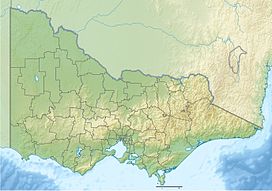Strzlecki Ranges
| Strzelecki Ranges | |
|---|---|
| Tolone | |

Streetscape of Yarragon, Victoria, with the Strzelecki Ranges in the background.
|
|
| Highest point | |
| Peak | Mount Tassie |
| Elevation | 740 m (2,430 ft) AHD |
| Geography | |
| Country | Australia |
| State/Province | Victoria |
| Range coordinates | 38°19′42″S 145°55′32″E / 38.32833°S 145.92556°ECoordinates: 38°19′42″S 145°55′32″E / 38.32833°S 145.92556°E |
| Parent range | Great Dividing Range |
The Strzelecki Ranges, also known as the Strzelecki Hills, is a low mountain range that is part of the Great Dividing Range, located in the West Gippsland region of the Australian state of Victoria. The range is situated between the Latrobe Valley to the north and Bass Strait to the south. It is named after Paweł Edmund Strzelecki, a Polish explorer, who led an expedition through this region in the 1840s.
The ranges also form a biogeographic subregion of the South Eastern Highlands bioregion, within the Interim Biogeographic Regionalisation for Australia.
The ranges were originally covered by a mosaic of wet forest, populated by 90-metre (300 ft) tall Mountain Ash trees, and temperate rainforest. As a result of clearing for agriculture in the late 19th and early 20th centuries, and of logging activity, the native vegetation of the Strzelecki Ranges bioregion is highly depleted, with only 19% of its original extent remaining. Most of the remaining forest is in the eastern ranges. Some has been protected inside the Tarra-Bulga National Park, the Morwell National Park and the Mount Worth State Park.
The highest peak is Mount Tassie (approximately 740 metres (2,430 ft).)
The Strzelecki Ranges fall within the territory of the Gunai or Kurnai people of Gippsland. In the Aboriginal Boonwurrung language, the range is called Tolone. Stone axes, grinding stones and bush ovens provide evidence of their use of the tall dense forests of the ranges. The ranges were a source of lyrebird tail feathers, which were used for ornamentation and for trade.
...
Wikipedia

